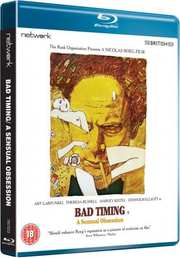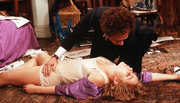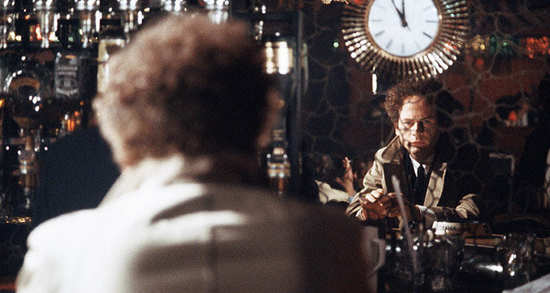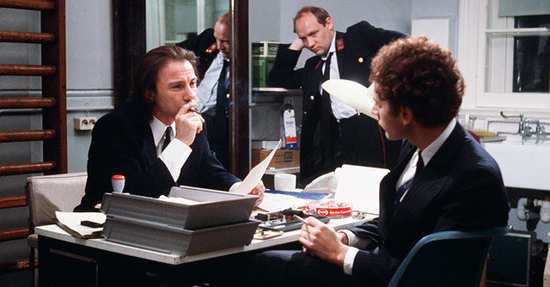Review for Bad Timing
There’s always something bleak about a Nicolas Roeg film and ‘Bad Timing’ is no exception. In fact, in common with films like ‘Walkabout’ , ‘Don’t Look Now’ and ‘The Man Who Fell to Earth’ (my favourite Roeg films), it has a very dark, ominous tone which makes for unsettling but memorable viewing. But not necessarily enjoyable. It could well be the bleakest of Roeg’s films. It certainly caused great consternation on release, even with its backers and distributors who desperately tried to disassociate themselves from it whilst simultaneously trying to market it enough to get their cash back. Talk about schizophrenic.
The principal difference for me between my favourite Roeg films and ‘Bad Timing’ is that it fails to add the thrills and wonder of those, focused as it is on the emotional turmoil of a single intense but fatally doomed relationship. There’s none of the edge of seat tension of ‘Walkabout’ and ‘Don’t Look Now’ or the sheer stylistic other worldliness of ‘The Man Who Fell to Earth’. It’s just very gritty, super-realism which in some regards makes its ugly conclusion even more distasteful.
‘Bad Timing’ is remarkable for the very unpredictable pairing of relative newcomer Theresa Russell and ‘Bright Eyes’ himself, singer Art Garfunkel – a deliberately unusual choice of romantic lead. To Roeg’s credit, it works and is highly believable. Both turn in incredibly convincing performances, ably captured by Roeg’s never still camera. Of course, Roeg had track record of putting musicians in leading roles with Jagger in ‘Performance’ and Bowie in ‘The Man Who Fell to Earth’. Nonetheless, it remains a very left-field piece of casting that definitely paid off.
It’s a very weird choice of film narrative too reflecting a highly volatile relationship between two Americans in late '70s Vienna. As it was released in 1980, that means it was very contemporary for its time. Clothes, cars, buildings and hair styles all reflect the era – other than Art Garfunkel’s which remains solidly individual with a wild, mad professor look across a slightly balding palate.
Vienna is an obvious setting for a psycho-analyst(Alex Linden – Art Garfunkel) to meet a wild and hedonistic American (Milena Flaherty – Theresa Russell) who clearly has ties to either the US or Eastern Europe security forces.
The film flashes backwards and forwards but pretty much opens with a young but comatose Milena being rushed into a hospital emergency room after over-dosing. Whilst it could be a suicide attempt, the police suspect foul-play from her jealous lover, Alex.
As Alex recounts events leading up to the ill-fated day we mix to flash-backs of their meeting at a party as well as many moments together as their relationship develops; Alex a calm but besotted observer and Milena an impetuous, hard-drinking, highly promiscuous companion.
The film was originally release as ‘Bad Timing: A Sensual Obsession’ and, despite its very uncommercial ring, this is not a bad descriptor. In fact, the sensual obsession with Russell may well have been a reflection of Roeg’s own infatuation. The pair married shortly after this movie and went on to make another seven films together.
The use of a Tom Waits track at the film’s start was sublime but merely set me up for a type of film that was not delivered – a bum steer perhaps.
Some viewers will find the scenes with pipes being pushed the choking Milena’s throat in the hospital disturbing and all viewers will find the film’s concluding scenes disturbing . I don’t want to share these here as a spoiler suffice it to say that, if you’re easily upset or offended, or are looking to be entertained rather than emotionally pulled through a hedge backwards, it won’t be for you.
There is no doubting that the film effectively delivers what Roeg has set out to do. It’s an incredibly disturbing film and the cinematography, editing and first-class acting make it a powerful film that packs a huge emotional punch. But not everyone wants their films to emotionally punch them.
Russell was only 21 at the time of filming so it’s to her credit that she does such a brilliant job. Garfunkel does surprisingly well too as a slightly cold, dispassionate observer – not at all what you’d expect from the guy who sang half of ‘Homeward Bound’ and all of ‘Bright Eyes’.
The Blu-Ray picture quality is good if not remarkable. I remember seeing the film at University at about the time of its release and, in common with many other films of the period, it features a lot of natural grain and grittiness. That is preserved here but it’s not a rich, lush or colourful experience, simply because it just wasn’t made that way.
It’s definitely a film worth seeing once. If you’re an academic, studying the art of making film, then you may well get more from it – particularly regarding the sophistication of the constant flash-back / flash-forward narrative. It’s not an easy film to watch or like but nonetheless, it’s great that it’s out there and available on Blu-Ray at last.







































Your Opinions and Comments
Be the first to post a comment!